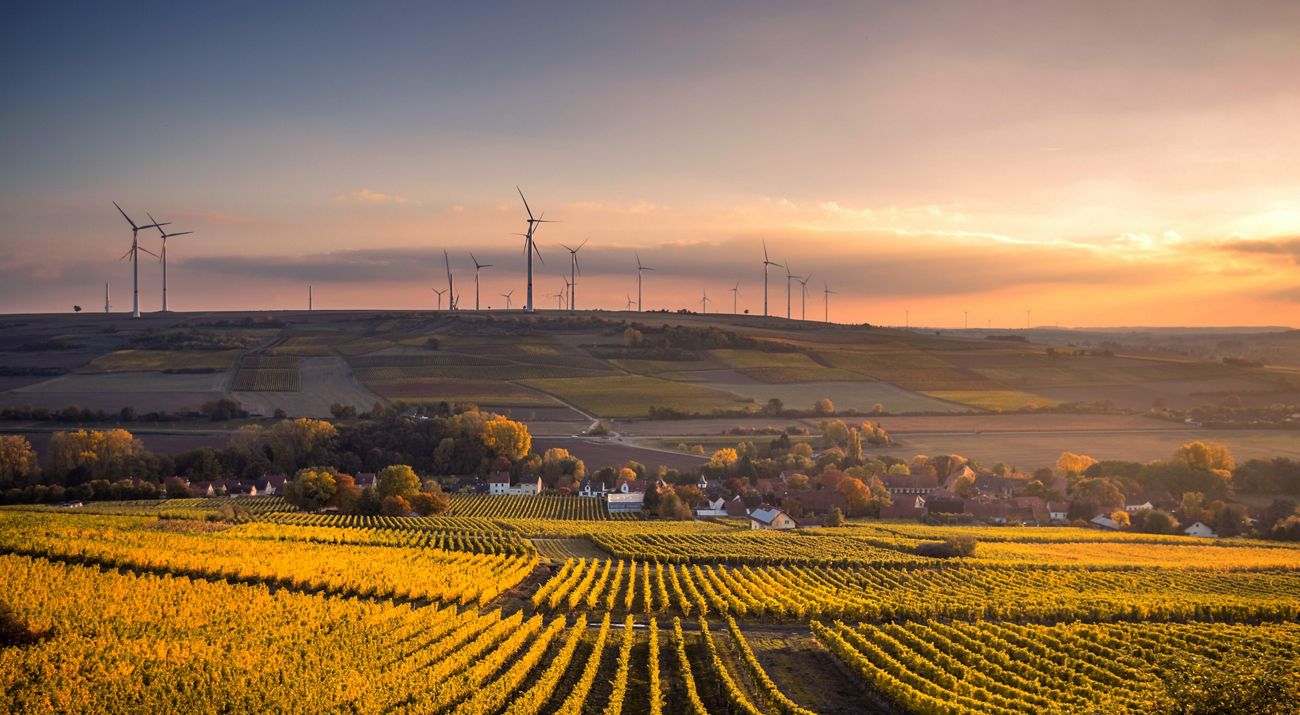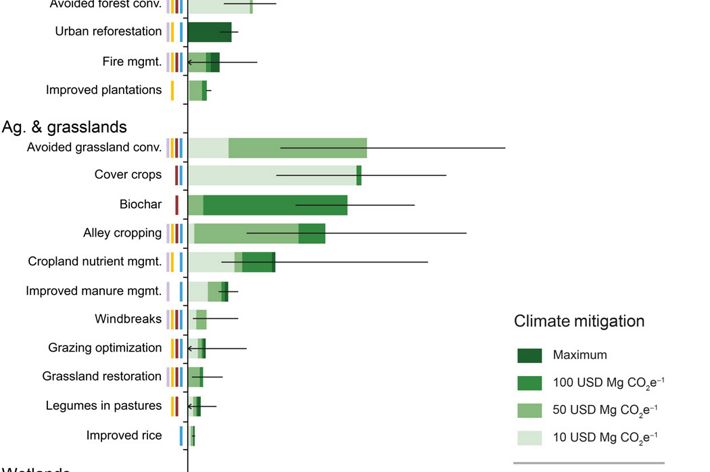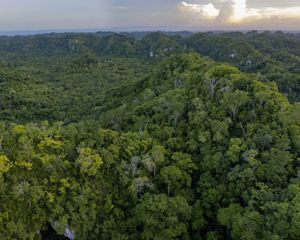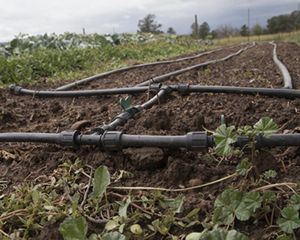
Through the generous support of the Doris Duke Charitable Foundation, The Nature Conservancy launched the U.S. Natural Climate Solutions Accelerator program in 2018 to support projects with potential to substantially increase the use of natural climate solutions. This grant-funding program focuses on helping kick-start innovative and scalable approaches for reducing greenhouse gas emissions and storing more carbon on natural and working lands across the United States. The program has awarded $2.55 million dollars to 15 projects in three rounds of grantmaking. In addition to financial support, grant recipients are offered mentorship and connection to networks and new partnerships.
Natural and working lands already make an 11 percent reduction in overall U.S. greenhouse gas emissions. In 2018 a TNC-led study found that natural climate solution—which include reforestation, cover crops, coastal wetland restoration, and other changes in land use and management practices could nearly triple that percentage —the equivalent of removing all U.S. motor vehicles from the road for a year. In addition to their climate mitigation benefits, natural climate solutions can help protect water supplies, improve soil health and productivity, provide wildlife habitat, buffer flood zones, create healthier communities and increase income for private landowners.
While significant progress is being made to expand adoption of renewable energy, electric vehicles and other technologies that reduce emissions, the Accelerator program seeks to correspondingly increase adoption of the oldest, and one of the most cost-effective carbon capture technologies there is—nature. The Accelerator strives to develop, test, and promote a diverse portfolio strategies and mechanisms that landowners, state and federal governments, corporations, and other leaders can deploy to accelerate climate action.
Application Process
***New pre-proposals are not being accepted at this time***
The selection committee is interested in supporting proposals from a diverse portfolio of projects representing novel approaches for scaling climate solutions in a range of natural and working lands (forests, agricultural lands and grasslands, and wetlands) and geographies. Please note, the program does not fund basic research unless it is part of a project with integrated scaling strategies.
Frequently Asked Questions
Contact Us
to sign up for programmatic updates.
Recording of informational webinar held for prospective applicants on February 28, 2020.
Natural Climate Solutions Overview: A Natural Path for U.S. Climate Action
US Natural Climate Solutions
Read Our StudyChanges in land management can make a big contribution to climate mitigation in the United States. A 2018 study examined the potential to implement natural solutions in the lower 48 states—such as reforestation, practices that increase soil health and forest carbon, restoration of coastal wetlands, as well as practices that prevent conversion of natural native habitats. These practices can increase carbon storage and reduce greenhouse gas emissions while also providing benefits for people, water and wildlife.
21 Natural Climate Solutions Pathways in the United States
Previous Awardees
From 2018-2020, the U.S. Natural Climate Solutions Accelerator program awarded $2.55M to 15 projects across three rounds of grantmaking, with funding generously provided by the Doris Duke Charitable Foundation. These projects are currently underway; testing the viability and scalability of their ideas.
- American Farmland Trust was awarded $200,000 to accelerate the adoption of regenerative farming practices and water conservation, such as cover crops and groundwater recharge to increase carbon sequestration and reduce greenhouse gas emissions and climate impacts in Illinois and California’s San Joaquin Valley. Success in these major, but distinct, agricultural regions has the potential to store a significant amount of soil carbon and could help leverage support for regional and state and federal policy efforts to scale-up regenerative farming practices across America. Within 15 months the project anticipates it will improve soil management across 150,000 acres and deliver conservation plans for increasing groundwater recharge potential and water conservation on at least 100,000 acres with 150 to 200 producers. Learn more.
- Arbor Day Foundation was awarded $200,000 to develop and launch Reforestation Hubs—public-private partnerships anchored in cities intended to turn wood-waste into valuable resources to be reinvested in tree planting and maintenance. These Reforestation Hubs will create a source of local capital, invest in nursery capacity, and engage local businesses, residents, and policymakers to drive tree planting and maintenance in urban centers and surrounding landscapes. Arbor Day Foundation will partner with Cambium Carbon to will conduct the stakeholder and city official engagement, collect and analyze tree data, and launch projects in 2-4 U.S. cities to improve carbon storage. Learn more.
- Dovetail Partners was awarded $200,000 to quantify the storage potential and opportunity across 1.5 million acres of Minnesota’s school trust lands in partnership with the Office of School Trust Lands. This work will focus on quantifying the potential for improved forest management strategies and seek to identify policy avenues to improve forest management for carbon storage. Up to 60,000 acres will be identified for carbon project development over the course of the project. Dovetail Partners will take the work to a national scale by collaborating with the National Association of State Trust Lands to develop state-specific storage estimates and policy guidance for up to nine states for a total of 10 million acres. Learn more.
- Rural Voices for Conservation Coalition (fiscally sponsored by Oregon-based Wallowa Resources) was awarded $160,000 to advance the use of controlled burning through cooperative partnerships between local partners and the US Forest Service. This effort will develop and promote streamlined partner participation in controlled burns, increasing the use of ecological fire, and reducing the carbon emissions caused by large wildfires. Since 2000, non-governmental organizations have been responsible for a 93 percent increase in successful controlled burns. This project aims to build on that success and formalize avenues for cooperative efforts through federal policy and administrative changes. Rural Voices for Conservation Coalition intends to improve management across 500,000 acres within the next 10 years. Learn more.
- Soil Health Institute received $100,000 to train 13,000 Certified Crop Advisors (CCAs) and agricultural retailers across the United States. CCAs and agricultural retailers are uniquely positioned to make soil health management recommendations to farmers to improve carbon storage. Over 15 months, the Soil Health Institute will compile and provide a tailored curriculum to CCAs and agricultural retailers via in-person trainings, podcasts, webinars, and in print materials to award continuing education credits. By developing and providing trainings, the Soil Health Institute believes it can improve soil carbon management across 150,000,000 acres within the next 10 years. Learn more.
- The Tierra Foundation was awarded $215,936 to focus on solutions to accelerate restoration of coastal wetlands and realize their carbon market potential. Coastal wetlands sequester more carbon per acre than most other ecosystems. Today, cost is a key barrier to coastal wetland restoration. The Tierra Foundation’s project will develop new public-private funding models and aggregating mechanisms to allow government agencies and private landowners to leverage carbon finance to implement wetland restoration. The project will focus on the Gulf Coast with a goal of directly impacting 4 million acres. In addition to the project’s climate mitigation benefits, restoring coastal wetlands improve water quality and protect communities from storm impacts. Learn more.
- Soil Health Institute's Ecosystem Services Market Consortium was awarded $100,000 to help test tools with potential to help farmers and ranchers interested in adjusting crop and livestock production systems to increase soil carbon sequestration and retention, improve water quality and conserve water use. Soils are one of the most cost-effective mechanisms for removing carbon dioxide from the atmosphere. Identifying effective tools for measuring, reporting and verifying ecosystem benefits are a critical step in achieving the Institute’s ultimate goal of launching a national Ecosystem Service Marketplace trading program. The Marketplace will provide interested landowners with access to markets to support their agricultural operations and could help generate carbon benefits across 250-300 million acres by 2030. Learn more.
- Savanna Institute received $250,000 to help farmers and farmland managers accelerate a practice called “alley cropping” in Illinois, Iowa, Minnesota and Wisconsin. Alley cropping is the practice of planting trees at wide spacings between rows of companion crops. In addition to increasing carbon storage by planting trees, alley cropping can increase crop production while diversifying farm income, improving soil retention, and providing wildlife habitat. The Savanna Institute and its collaborators will facilitate partnerships between tree farmers, crop farmers, landowners, and financiers through the development of a brokerage platform, help to bundle projects into investment portfolios, and provide monitoring services to evaluate environmental and agronomic performance. Learn more.
- The Nature Conservancy was awarded $107,000 to expand the Family Forest Carbon Program, a partnership Program with the American Forest Foundation. The Program, funded in the Central Appalachians region and California in the first Accelerator grant cycle, is designed to incentivize family forest landowners to keep their forests as forests and to adopt carbon-friendly forest management practices and generate income through voluntary carbon markets and other sources. Using a payments-for-practices model, the Program will have lower monitoring, reporting and verification costs making it easier for owners of smaller acreages to access carbon markets. Project partners will develop carbon-friendly practices applicable to forests in southern New England and eastern New York; hold forestry expert and practitioner workshops in Massachusetts and Vermont; and demonstrate the program with pilot landowners. Learn more.
- Manomet Inc. of Massachusetts was awarded $177,000 to increase the climate mitigation value of commercial forest land. Manomet will partner with members of their Climate Smart Land Network, including many of the major forestry companies in North America, to quantify the benefits and improve enabling conditions for the adoption of management practices with potential to enhance climate change mitigation. Manomet is a science-driven sustainability nonprofit with a long history of research and engagement in the forestry sector. Long-term, their project is aimed at influencing management to increase carbon sequestration potential across 33 million acres from Maine to California. Learn more.
- Vermont Land Trust – Vermont Forest Carbon Phase Two program intends to prove the value of aggregation of forest carbon markets. Learn more about the project.
- TreeFolks – Travis County Floodplain Reforestation Program supports riverbank reforestation in Austin with replication and scaling up potential across urban areas. Learn more about the project.
- Coalitions & Collaboratives, Inc. – working with RenewWest on their project, Forests of the Future: Replanting Burn Scars for Carbon Sequestration and Ecosystem Services, plans to unlock post fire restoration by making it attractive for private investment. Learn more about the project.
- American Forest Foundation and The Nature Conservancy – The Family Forest Carbon Initiative aims to mobilize the value of forest carbon for smaller land owners to unlock major NCS benefits. Learn more about the project.
- The Nature Conservancy – Central Cascades Forest Products: Catalyzing a Landscape-scale Climate Solution for the U.S. Interior West program aims to reduce the risk of fire, creating resilience prior to catastrophic loss, and mobilizing restoration at scale on federal lands. Learn more about the project.
The Steering Committee
Robert Bonnie, Fellow, Duke University
Rich Brown, Senior Vice President of Global Environmental Group, Bank of America
Jad Daley, President and CEO, American Forests
Jacqueline Emanuel, Director, National Partnership Office, U.S. Forest Service
Jennifer Phillips, Senior Policy Advisor, U.S. Climate Alliance
David Ford, Senior Fellow, American Forest Foundation
Catherine Macdonald, North America Natural Climate Solutions Director, The Nature Conservancy
Program Staff
Eriks Brolis, US NCS Accelerator Program Manager, The Nature Conservancy
Natalya Skiba, US NCS Accelerator Program Coordinator, The Nature Conservancy
Disclaimer
The Nature Conservancy is a District of Columbia, USA, 501(c)(3) non-profit corporation that operates in all 50 U.S. states and impacts conservation in 72 countries and territories: 38 by direct conservation impact and 34 through partners. Grants will be awarded in a non-discriminatory manner with fair treatment given to all applicants. As a 501(c)(3) organization, TNC must abide by the applicable rules of the U.S. Internal Revenue Code and will conduct relevant legal analyses during its selection of finalists for the Accelerator program. Accordingly, TNC reserves the right to reject any and all applications for any reason whatsoever, to waive technicalities, and to award grants in a manner that is consistent with the organization’s policies and procedures. Please also see TNC’s Privacy Policy.


